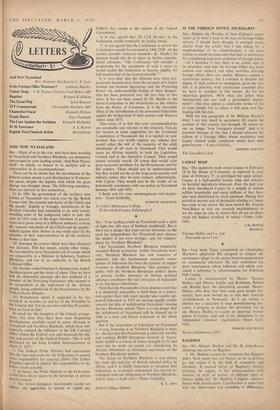And Now Nyasaland
Rev. Kenneth MacKenzie, C. T. Leys
Is the Foreign Office Necessary? Anthony Hartley Camay Soap J. H. Trower, Francis Noel-Baker, MP Bagehot Richard Woliheim The Great Ship Lord Kinross ITV Commercials Christopher Mayhew, MP Chancellor Fiscal Kenneth Dibben Frank Harris Guy Chapman The Case Against the Architect Kenneth MeHanby 1). H. Lawrence A. L. Rowse English Neo-Classical Artists David Irwin
AND NOW NYASALAND
SIR,—Many of us in this city, who have been working in Nyasaland and Northern Rhodesia, are immensely encouraged by your leading article, 'And Now Nyasa- land'—so timely, so honest in its analysis and so constructive in its recommendations,
There can be no doubt that the introduction of the federal system meant a real devaluation in Protector- ate status, despite the legality with which the great change•was brought about. The following considera- tions arc relevant in this connection :
(i) In 1891 the government of the territory now known as Nyasaland was taken over by the British Crown with 'the consent and desire of the Chiefs and the people.' Rightly or wrongly, missionaries of the Scottish Churches had something to do with recom- mending some of the indigenous rulers to take this step. In 1953 some of the major functions of govern- ment were given away to a different authority without the 'consent and desire of the Chiefs and the people,' indeed against their desires as was made clear by the speeches of their representatives in all the statutory bodies at that time.
(ii) Amongst the powers which were then alienated was Defence. This has meant, among other things, the introduction on to Nyasaland soil of troops which are responsible to a Minister in Salisbury, Southern Rhodesia, and not to an authority in the British Colonial Office.
(iii) Another ceded function is Immigration, includ- ing deportation and the status of aliens. Thus we have had the distasteful spectacle this last weekend of a member of the Protecting Parliament, who seemed to be sympathetic to the aspirations of the African people, being ordered out of the Protectorates by the Federal Home Minister.
(iv) Protectorate status is supposed to be 'en- trenched' in Articles (d) and (e) of the Preamble to the Federal Act. Yet we are now told that Preambles have no force in law!
So much for the inception of the federal arrange- ment. Yet since then there have been disquieting developments, carefully noted by many Africans in Nyasaland and Northern Rhodesia, which have sub- stantially reduced the influence of the UK Colonial Office within the Federal area and increased the dig- nity and powers of the Federal Premier. This is well illustrated by the 3oint London Announcement of April 27, 1957: 'I. The Federal Prime Minister had represented that the time had come for the Federation to assume more responsibility for external affairs. The United Kingdom agreed to entrust this responsibility to the fullest extent possible. '2. In future, the Prime Minister of the Federation would have direct access to the Sovereign in certain special matters.
1. The United Kingdom Government would not initiate any leaislation to amend or repeal any Federal Act, except at the request of the Federal Government.
'4. It was agreed that all Civil Services in the Federation would eventually be locally based.
'5, It was agreed that the Conference to review the Constitution would be convened in 1960. [NB: At the earliest possible statutory moment.—K. MacK.] Its purpose would also be to agree on further constitu- tional advances. "The Conference will consider a programme for the attainment of such a status as would enable the Federation to become eligible for full membership of the Commonwealth." '• It is very clear that the Africans have been pro- gressively weaned away from the prospect of a future worked out between t4mselves and the Protecting Power. An understandable feeling of sheer despera- tion has been generated over the last four or five years. It has not been caused by Dr. Banda or the Accra Conference or the missionaries or the visitors from the House of Commons. It is the inevitable effect of the introduction of the unwanted Federation against the background of their contact with Western values since 1875.
Thus many of us feel that your recommendations are reasonable and relevant to the situation. You do not venture to make suggestions for the Territorial Constitution of Nyasaland, but it is implicit in your position that you would support any scheme that would reflect the will of the majority of the adult inhabitants of all races in Nyasaiand. That would mean an African majority in both the Legislative Council and in the Executive Council, They would almost certainly secede. Of course that would raise great economic problems for the Protectorate and for this country. These should not be underestimated; but they would not be of the large-scale security and military nature that we now connect, unfortunately, with Cyprus. They would also be the results of an honourable consistency with our policy in Nyasaland between 1891 and 1953.
1 thank you for your encouragement and inspira- tion.—Yours faithfully, 23 Inverleith Terrace, Edinburgh, 3


































 Previous page
Previous page